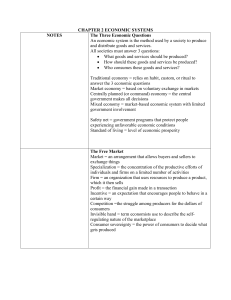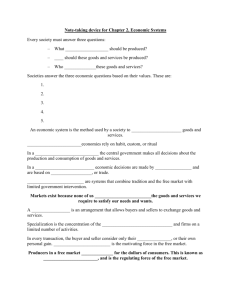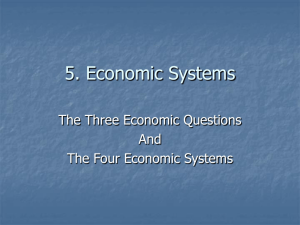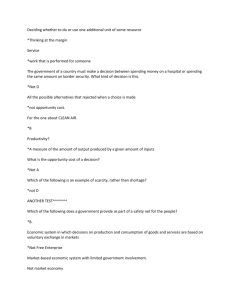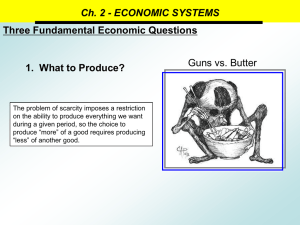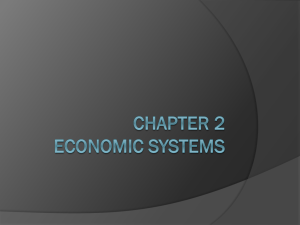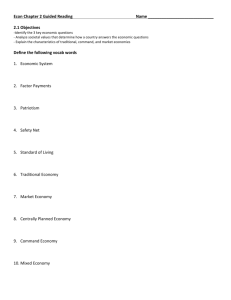DAY 11 8/27/14 - Mr. Goblirsch's Social Studies Class
advertisement
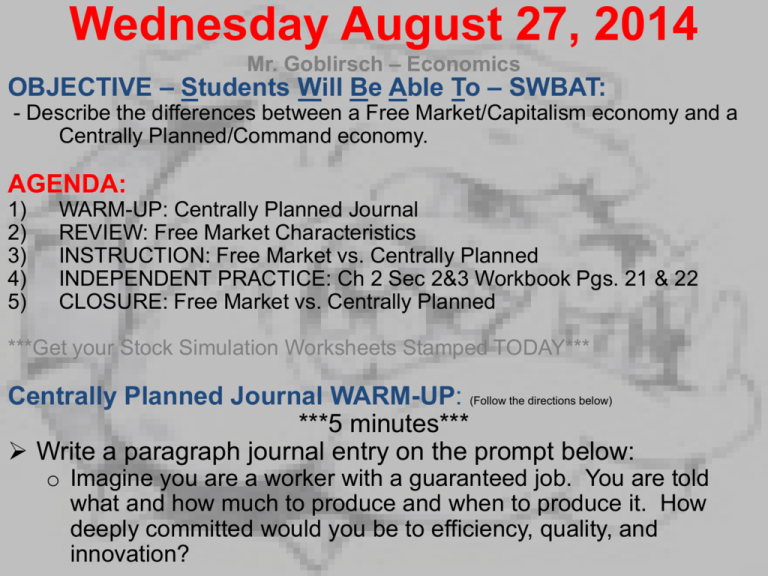
Wednesday August 27, 2014 Mr. Goblirsch – Economics OBJECTIVE – Students Will Be Able To – SWBAT: - Describe the differences between a Free Market/Capitalism economy and a Centrally Planned/Command economy. AGENDA: 1) 2) 3) 4) 5) WARM-UP: Centrally Planned Journal REVIEW: Free Market Characteristics INSTRUCTION: Free Market vs. Centrally Planned INDEPENDENT PRACTICE: Ch 2 Sec 2&3 Workbook Pgs. 21 & 22 CLOSURE: Free Market vs. Centrally Planned ***Get your Stock Simulation Worksheets Stamped TODAY*** Centrally Planned Journal WARM-UP: (Follow the directions below) ***5 minutes*** Write a paragraph journal entry on the prompt below: o Imagine you are a worker with a guaranteed job. You are told what and how much to produce and when to produce it. How deeply committed would you be to efficiency, quality, and innovation? PRIOR KNOWLEDGE: Free Market Review 1. Competition is important to a Capitalist/free market system because … 2. The “invisible hand” is … 3. The difference between the Factor market and the Product market is … Market Economies (Capitalism) A. Market: Any medium to get buyers and sellers together B. Advantages: A. Invisible hand = efficiency B. Can adjust to change – innovation encourages growth C. Individual freedom D. Less government interference E. Variety of goods available = consumer satisfaction C. Disadvantages: A. Does not provide for the basic needs of everyone B. Gov’t must provide for justice, national defense, education, “comprehensive health care” C. Uncertainty. D. Market economies can fail if three conditions not met: (1) must have competition (2) resources must be able to move freely (3) consumers need information 3 STRUCTURED ACADEMIC DISCUSSION A. An advantage of a Free Market economy is … B. A disadvantage of a Free Market economy is … Command Economies (Socialism) A.Advantages: A.Government can change economy quickly. Soviet Union & China industrialized quickly (cost of millions of lives… but hey, got the job done). B. Health care and public services available to all at little or no cost. The quality sucks, but hey “access to some services is better than none.” (Really?) B.Disadvantages: A.Not designed for consumers. B. No incentive to work hard. Ex) Soviets measured production quotas of electric motors based on tonnage produced. Workers started producing the heaviest motors in the world. A.HUGE government bureaucracy. SLOW decision making process. Inefficient. Can’t adapt B. Doesn’t reward innovation 5 STRUCTURED ACADEMIC DISCUSSION A. An advantage of a Centrally Planned economy is … B. A disadvantage of a Centrally Planned economy is … The Former Soviet Union • Soviet Agriculture – Use of collectives – Little incentives to work hard or create better product. • Soviet Industry – Inefficient & wasteful – Lack of a Profit motive • Soviet Consumers – Excessive shortages of everything Problems with Centrally Planned Economies • Inferior Products • Shortages • Cannot meet the needs & wants of consumers • Workers lack incentives to work hard • Does not reward innovation • Expensive & inefficient bureaucracy Problems of a Centrally Planned Economy Centrally planned economies face problems of poorquality goods, shortages, and diminishing production. Chapter 2 Section Main Menu Market Economies (cont.) Figure 2.1 Comparing Economic Systems 10 CLOSURE: Free Market vs. Centrally Planned • I, ___________, would want to live in a __________ economic system because … AND • I, __________, would NOT want to live in a __________ economic system because … THE DOW STOCK SIMULATION DIRECTIONS: • You have $5,000 to invest in the stock market. ***You cannot spend over $5,000*** • Select 5 stocks from The Dow Jones Industrial Average to invest your money in. • How many shares you buy of each stock is up to you. • Multiply the # of shares you want by the Last trade amount to calculate the Total Worth of that stock. – # shares X Last Trade $ = Total Worth

